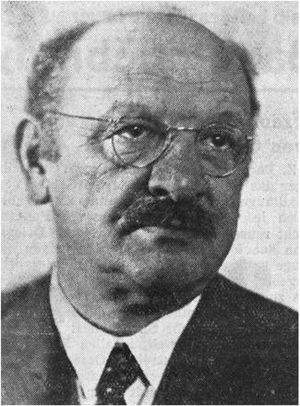Oskar Fischer facts for kids
Quick facts for kids
Oskar Fischer
|
|
|---|---|
 |
|
| Born | 12 April 1876 Slaný, Bohemia
|
| Died | 28 February 1942 (aged 65) Terezin, Czechoslovakia
|
| Nationality | Czech |
| Education | Prague University Strasbourg University |
| Medical career | |
| Profession | Doctor |
| Field | Psychiatry Neuropathology |
| Institutions | German University in Prague |
| Research | Dementia Alzheimer disease |
Oskar Fischer (born April 12, 1876 – died February 28, 1942) was a Czech doctor. He was a psychiatrist, which means he studied mental health. He was also a neuropathologist, meaning he studied brain diseases. Fischer made important discoveries about brain conditions like dementia and Alzheimer's disease. His work was largely forgotten for many years, but it was rediscovered in 2008.
Contents
Oskar Fischer's Early Life and Learning
Oskar Fischer was born on April 12, 1876, in Slaný, a town in central Bohemia. This area is now part of the Czech Republic. His family spoke German. His father managed a large farm there.
Oskar went to primary and secondary school in Slaný. After that, he studied medicine at two universities: Prague University and Strasbourg University. He finished his medical degree at Prague University in 1900.
Oskar Fischer's Career as a Doctor
Fischer started his career in 1900 at the German University in Prague. He worked in the department that studied how diseases affect the body. In 1902, he moved to the psychiatry department at the same university, where he worked until 1919.
During World War I, Fischer was a head doctor for brain and mental health. He worked at a hospital in Prague. He helped many soldiers who had mental health problems after fighting in the war. Later, he was moved to another hospital in Pardubice. There, he met Franziska, who was a nurse with the Red Cross. They later married and had twin children, Lotte and Heinz.
Fischer stopped working at the German University in 1939. He then opened his own private clinic in Prague. He worked there, helping people with brain and mental health issues, until 1941.
Fischer's Work on Alzheimer's Disease
While at the German University, Fischer was part of a group of brain doctors in Prague. This group was led by Arnold Pick. They were one of two main groups studying Alzheimer's disease at the time. The other group was in Munich, where Alois Alzheimer worked. These two groups were rivals. The disease was named "Alzheimer's disease" in a book by Emil Kraepelin in 1910. This made the Munich group seem more important.
Fischer used new ways to stain brain tissue and study autopsy results. He described "senile plaques," which are still known as a key sign of Alzheimer's disease. Alois Alzheimer had also found "neurofibrillary tangles," another important sign. Both Fischer and Alzheimer thought that these plaques might be caused by tiny living things called microorganisms.
In 1907, Fischer published an article about his findings. He studied the brains of 16 older people after they had passed away. He described the changes he saw in the brain's tissues and cells. He found clumps of a substance called amyloid. He called these clumps "Sphaerotrichia multiplex cerebri." He used this term in other articles he published in 1910 and 1912. In his studies, he found these changes in 58 out of 275 cases.
How Fischer's Work Was Rediscovered
Even though Oskar Fischer studied Alzheimer's disease a lot and made big contributions, his work was not well known for a long time. It was only recognized much later through studies in old records in Prague.
In 1998, two researchers from the University of California at Irvine College of Medicine mentioned Fischer's work. But his studies did not get much attention until 2008. That year, Michel Goedert from Cambridge University looked through the records at Charles University in Prague. He found how important Fischer's work was. He also talked to Fischer's family and Czech researchers.
In 2009, Pavel Kalvach from Charles University said that Fischer might have made even more important discoveries than Alois Alzheimer. There were several reasons why Fischer's work was overlooked. These included strong feelings between different countries, unfair treatment of Jewish people at the time, and the competition between the Prague and Munich medical schools.
A Difficult Time and His Passing
In 1941, about three years after Germany took over Czechoslovakia, Fischer was arrested. He was held in a small fortress in Terezin, which was a camp near Prague. He passed away in the camp on February 28, 1942, at the age of 65.
 | May Edward Chinn |
 | Rebecca Cole |
 | Alexa Canady |
 | Dorothy Lavinia Brown |

